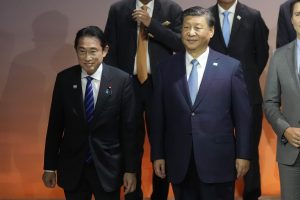The term a “mutually beneficial relationship based on common strategic interests” to describe the relationship between China and Japan was once again used at their summit meeting late last year. State Councilor and Foreign Minister Wang Yi seemed to attach particular importance to it. In fact, the expression was first used between Japanese Prime Minister Abe Shinzo and Chinese President Hu Jintao in 2006. Then, when Hu visited Japan in 2008, a Joint Statement between Japan and China was released in the context of this “mutually beneficial” relationship. That joint statement is one of the four foundational documents of the bilateral relationship.
The term “mutually beneficial relationship based on common strategic interests” combines strategy and mutual benefit. Mutual benefit suggests win-win, which would normally be shuangying (双赢) in Chinese. However, the Japanese language does not use these characters, and that is apparently why huhui (互惠, or “reciprocity”) is used instead. At the time, Japan did not often use “strategy” in its foreign relations, so deliberately using this word in its relations with China, in contrast to the conventional “friendship,” is seen as an attempt at keeping the relationship unbiased. A “mutually beneficial relationship based on common strategic interests” is a term that suggests a new Japan-China relationship, one that differs from “friendship” and that can be understood as combining Japan’s concern about remaining unbiased and the Chinese view that Japan-China relations still involve considerable common interests.
Back in 2006, however, Japan’s GDP was still larger than China’s, and the military balance still clearly favored Japan and the United States. U.S.-China relations were also relatively amicable. In 2010, China overtook Japan as the world’s second largest economy, and then in the late 2010s, U.S.-China relations underwent a major transformation. The term “mutually beneficial relationship based on common strategic interests” was used publicly until State Councilor Yang Jiechi’s visit to Japan and his meeting with Abe in 2017. However, although the term “strategic communications” was used during Abe’s visit to China in October 2018, “mutually beneficial relationship based on common strategic interests” was not. In other words, the term has now been brought back into use for the first time in six years.
It has been said that the reason for its return is that the former Japanese Ambassador to China Tarumi Hideo made a reference to it at an event commemorating the 45th anniversary of the conclusion of the Treaty of Peace and Friendship between Japan and China in October 2023, in response to which State Councilor Wang Yi requested that the term be used. However, ahead of the Japan-China summit meeting between current Japanese Prime Minister Kishida Fumio and President Xi Jinping, especially in light of the importance of the term for the Chinese side, Wang might have used the term when explaining the importance of a Japan-China summit meeting to Xi, for example by saying that Japan using the term shows that the Japanese value China or that Tokyo accepts China’s diplomatic stance of emphasizing win-win relationships.
The challenge now lies in working out the details of this “mutually beneficial relationship based on common strategic interests.” The return of this wording does not signify any immediate change in the relationship, and actually there is no shared understanding of what it really means in the first place. The task for the two sides is to articulate a shared understanding as well as future challenges. It is likely that a Japan-China summit will take place in connection with the Japan-China-South Korea trilateral summit to be held at some point. Will Kishida and Chinese Premier Li Qiang lay the foundations for future Japan-China relations? This will likely be a touchstone for bilateral relations in 2024.































